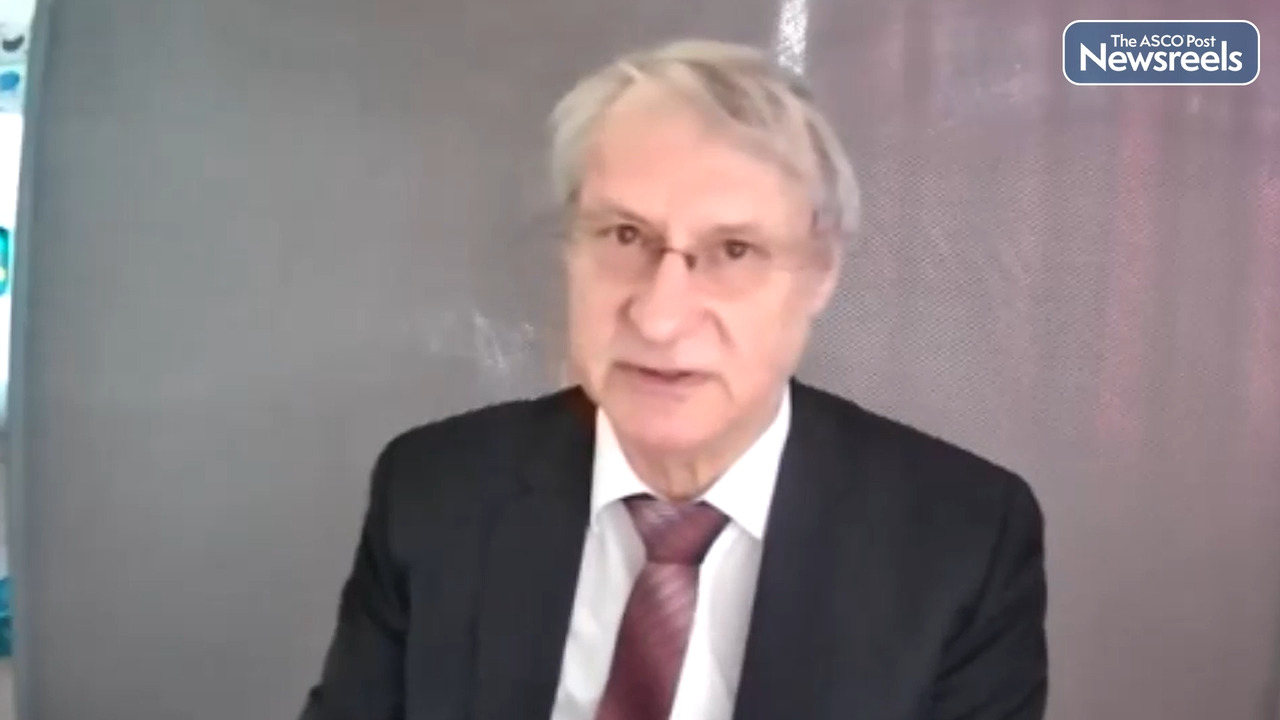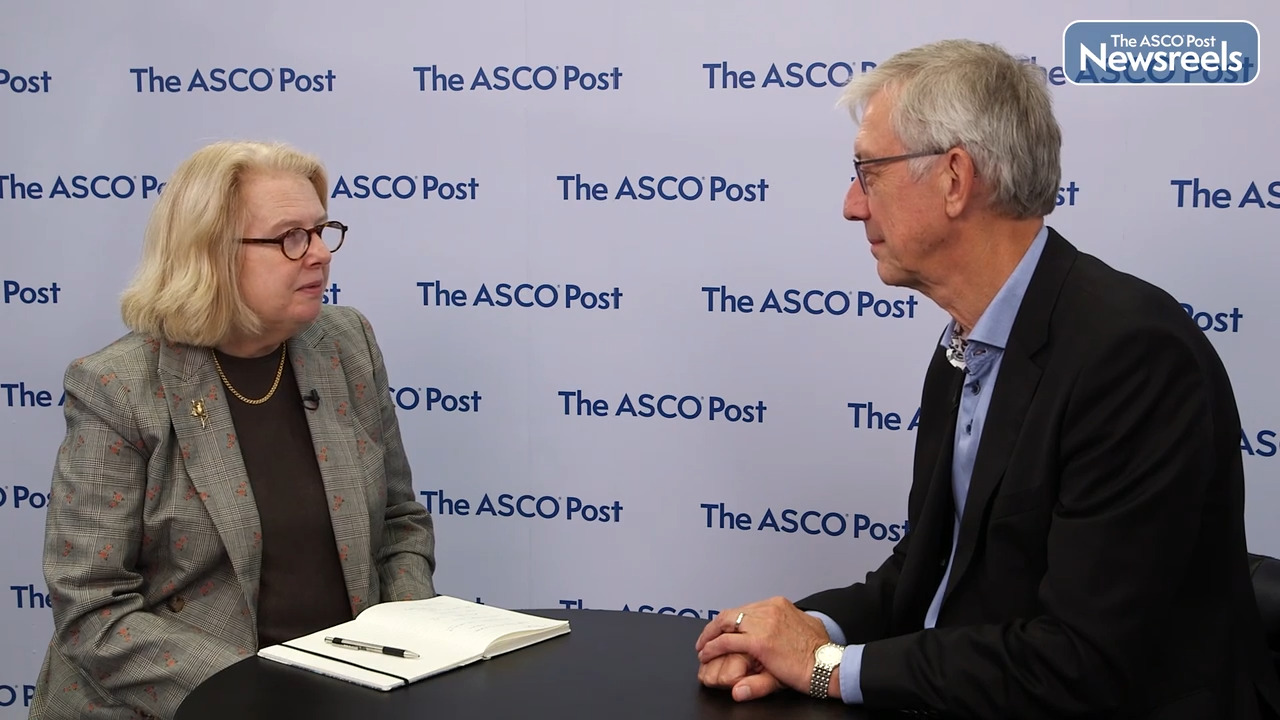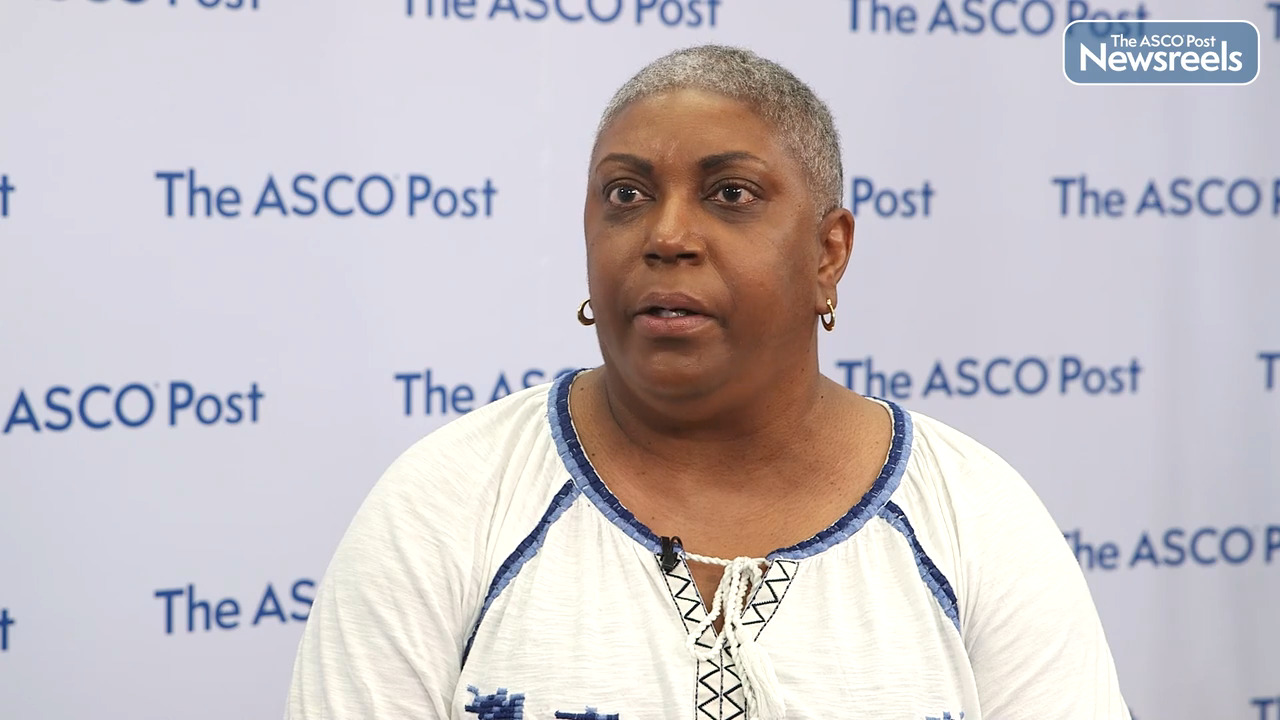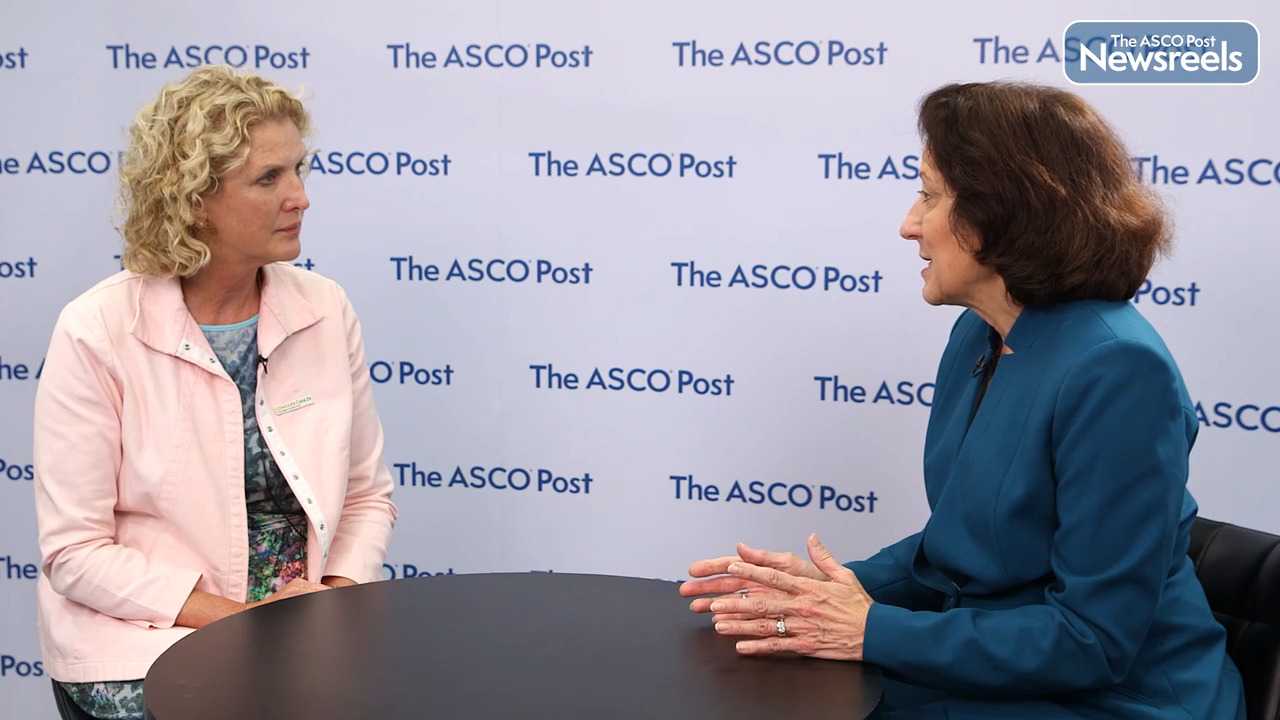Georgina V. Long, MD, PhD, on Melanoma: New Data on Pembrolizumab, Dabrafenib, and Trametinib
2022 ASCO Annual Meeting
Georgina V. Long, MD, PhD, of the Melanoma Institute Australia, The University of Sydney, discusses findings from the NeoTrio trial on neoadjuvant pembrolizumab alone, in sequence with, or concurrent with dabrafenib plus trametinib in patients with resectable BRAF-mutant stage III melanoma. The study may help clinicians determine the optimal combination of therapy (Abstract 9503).
Transcript
Disclaimer: This video transcript has not been proofread or edited and may contain errors.
The NeoTrio trial is one of the many neoadjuvant trials that we are now conducting in melanoma, in Resectable Stage III Melanoma. It is the most wonderful platform. Not only do we rapidly assess the efficacy of drug therapies, cutting drug development time from over two years to six months but we also get wonderful translational tumor tissue to then understand resistance, because this is the greatest unmet need in melanoma. So the NeoTrio trial was a neoadjuvant trial conducted in stage three resected melanoma. Patients were randomized to three different arms. The hypothesis in this trial was how do we best combine BRAF and MEK targeted therapy with anti-PD-1 immunotherapy? Should we give them all three together? Can we get away with just giving a little bit of the targeted therapy in sequence with the anti-PD-1? And this rationale is because we know that BRAF and MEK inhibitors bring in lots of T cells within one week of starting treatment. And then the third arm was a control arm of anti-PD-1 alone. We have previously conducted a neoadjuvant trial with just targeted therapy and that was the NeoCombi trial previously published in The Lancet Oncology, which forms the second control arm. So in this three arm trial, we saw that the complete pathological response rate was very different in the three arms. For the triple therapy of all three drugs together, it was 50% with the major pathological response rate of 55%. The major pathological response is the complete response plus the near complete response. For the sequencing arm, we did not see such a high level of pathological response and it was 15% for complete pathological response and 30% for major pathological response. For the PD-1 alone arm, we soar a 30% complete pathological response rate and a 40% major pathological response rate. So in summary for the pathological response, we saw the highest rate within the triple therapy arm and the lowest rate within the sequencing arm, which was unlikely to be any different from the PD-1 alone arm. In terms of the number of patients that were 20 patients in each arm because this is mainly a translational signal finding neoadjuvant trial. Now what's really important is the quality of these pathological response rates from a pooled analysis that we published in Nature Medicine, first author Alex Menzies, we saw that when you had a pathological response with immunotherapy, we saw a sustained relapse free survival benefit, almost a flat lining of the relapse free survival patients rarely recurred. With targeted therapy however, we see that if you have a pathological response, you can indeed recur. Although complete pathological responders do well with just targeted therapy, they still can recur unlike immunotherapy. Now, what we saw in this trial was that although we saw a higher pathological response rate with the triple therapy patients could recur. In fact, already we've had one recurrence from the major pathological responders and we've had no recurrences in the major pathological responses with PD-1 alone. So in short, this trial showed that sandwiching or sequencing the BRAF/MEK, did not provide that extra activity with the PD-1 that we were hoping for. And that in fact, immunotherapy still confers the greatest benefit in terms of correlating the relapse-free survival with the pathological response. We also saw significant toxicity with the triple therapy particularly pyrexia, driven by the Dabrafenib and Trametinib and enhanced by the PD-1, anti-PD-1 pembrolizumab. And we also saw many patients have to cease the BRAF and MEK inhibitor Dabrafenib and Trametinib during the neoadjuvant phase. The take home message is that giving a little bit of BRAF/MEK inhibitor before your PD-1 does really not change the long term outcome. Leveraging that T-cell infiltrate that BRAF and MEK inhibitors give, cannot be done in this way. And it's probably a nonspecific T-cell infiltrate that we see.
Related Videos
The ASCO Post Staff
Rainer Fietkau, MD, of Germany’s University Hospital Erlangen, discusses phase III findings of the CONKO-007 trial, which examined the role of sequential chemotherapy and chemoradiotherapy administered to patients with nonresectable locally advanced pancreatic cancer following standard-of-care chemotherapy (Abstract 4008).
The ASCO Post Staff
Ursula A. Matulonis, MD, of Dana-Farber Cancer Institute, and Ignace Vergote, MD, PhD, of Belgium’s University Hospitals Leuven, discuss interim safety and efficacy results from a third dose-expansion cohort evaluating first-line tisotumab vedotin-tftv plus pembrolizumab in patients with recurrent or metastatic cervical cancer. Data on the combination showed durable antitumor activity with a manageable safety profile (Abstract 5507).
The ASCO Post Staff
Nancy Davidson, MD, of the Fred Hutchinson Cancer Research Center, reviews results from four abstracts about the importance of long-term follow-up in studies of adjuvant endocrine therapy for hormone receptor–positive breast cancer. Because the natural history of hormone receptor–positive breast cancer is long, an effort is underway to improve selection of patients by clinical parameters or biomarkers, refine the endocrine therapy background, and administer more effective combinations of endocrine therapy with other agents.
The ASCO Post Staff
Stephanie Walker, a former nurse and current activist with the Metastatic Breast Cancer Alliance, discusses findings from the BECOME project (Black Experience of Clinical Trials and Opportunities for Meaningful Engagement). They show that, even though Black patients comprise between 4% and 6% of all clinical trial participants, Black women with metastatic breast cancer are willing to consider taking part if steps were taken to increase their awareness, build trust through clear communication with health-care providers, involve people of shared racial/ethnic identity and health experience, and help patients find and access trials (Abstract 1014).
Lisa A. Carey, MD, of the University of North Carolina Lineberger Comprehensive Cancer Center, and Hope S. Rugo, MD, of the University of California, San Francisco, Helen Diller Family Comprehensive Cancer Center, discuss phase III results from the TROPiCS-02 trial. This study showed that sacituzumab govitecan-hziy was more beneficial than single-agent chemotherapy in terms of progression-free survival in heavily pretreated patients with hormone receptor–positive/HER2-negative and unresectable advanced breast cancer (LBA1001).





